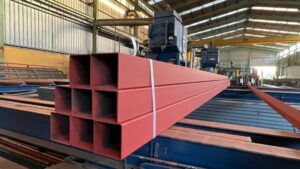Germany’s steel and metals working industries are looking back at weakening performance in 2022, and hope that in 2023 national politics will become friendlier towards manufacturing industries.
Production of fabricators in 2022 fell by 0.3% year-on-year, according to their federation WSM.
Although the fourth quarter was slightly better overall than Q4 2021, the increase of 0.9% is only meagre. On top of that, the trend points downwards, WSM notes. Production lost 3.4% in Q4 2022 compared to Q3. “We need decisions now that support growth forces, not slow them down. 2023, the ‘Year of Industry’, needs an avowed ‘yes’ to Germany and Europe as a business location – as a prelude to a long-term industrial policy,” says WSM economist Holger Ade.
In a separate statement, the federation bemoans the state of infrastructure, especially for transportation. “Blocked bridges, miserable roads, inadequate connections – things are not running smoothly on Germany’s routes. We urgently need renovation and rapid road expansion, so that companies can be reached without problems,” Kallanish hears from WSM managing director Christian Vietmeyer.
A defective transport network also endangers climate and sustainability goals, WSM underlines. Every kilometre of diversions increases fuel consumption and emissions. The desired circular economy comes to a standstill when companies are no longer accessible for waste management companies, it says.
Christian Koehl Germany






